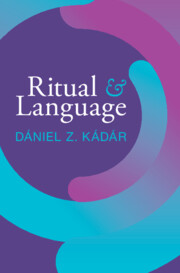Book contents
- Ritual and Language
- Ritual and Language
- Copyright page
- Contents
- Figures
- Tables
- Acknowledgements
- Foreword
- 1 Introduction
- Part I The Language of Ritual: Foundations
- Part II Ritual Frame in Interaction: The Complex Interactional Features of Ritual
- 5 Mimesis
- 6 (Self-)Display
- 7 Liminality
- Part III Methodological Issues
- Notes
- References
- Index
- References
5 - Mimesis
from Part II - Ritual Frame in Interaction: The Complex Interactional Features of Ritual
Published online by Cambridge University Press: 07 March 2024
- Ritual and Language
- Ritual and Language
- Copyright page
- Contents
- Figures
- Tables
- Acknowledgements
- Foreword
- 1 Introduction
- Part I The Language of Ritual: Foundations
- Part II Ritual Frame in Interaction: The Complex Interactional Features of Ritual
- 5 Mimesis
- 6 (Self-)Display
- 7 Liminality
- Part III Methodological Issues
- Notes
- References
- Index
- References
Summary
Chapter 5 focuses on the phenomenon of mimesis. All rituals are mimetic because ritual language use itself triggers replication and reciprocation. However, Chapter 5 will show that in various interactionally complex rituals one can observe a specific mimetic phenomenon – ‘performative mimesis’ – which has not received sufficient attention in the study of language use, and which is worth exploring if one wants to understand why in certain ritual contexts language users play ‘roles’. Simply put, the concept of ‘performative mimesis’ refers to contrived interactional performance whereby the performer sustains mimicking a predated interactional schema, just like an actor in a theatre manages a performance on stage by enacting a role. Performative mimesis is a particularly interesting phenomenon to consider because the participants of a ritual which necessitates such mimetic behaviour follow often invisible and uncodified scripts. Chapter 5 includes a case study which describes performative mimesis in Chinese university military training courses, representing an understudied ritual drawn from the realm of higher education in China.
Keywords
- Type
- Chapter
- Information
- Ritual and Language , pp. 79 - 95Publisher: Cambridge University PressPrint publication year: 2024



